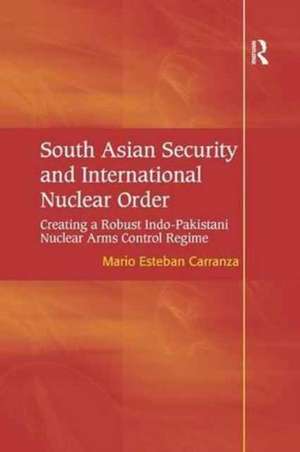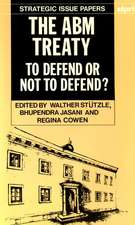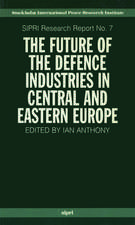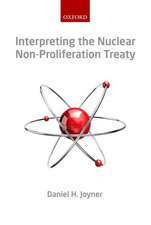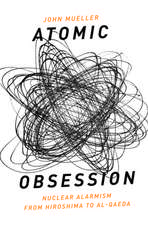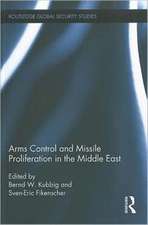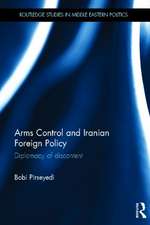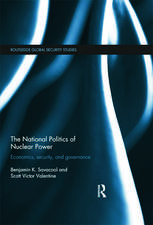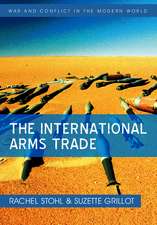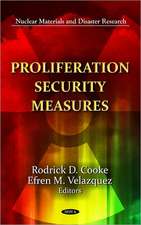South Asian Security and International Nuclear Order: Creating a Robust Indo-Pakistani Nuclear Arms Control Regime
Autor Mario Esteban Carranzaen Limba Engleză Paperback – 17 noi 2016
| Toate formatele și edițiile | Preț | Express |
|---|---|---|
| Paperback (1) | 469.34 lei 6-8 săpt. | |
| Taylor & Francis – 17 noi 2016 | 469.34 lei 6-8 săpt. | |
| Hardback (1) | 1057.09 lei 6-8 săpt. | |
| Taylor & Francis – 4 sep 2009 | 1057.09 lei 6-8 săpt. |
Preț: 469.34 lei
Nou
Puncte Express: 704
Preț estimativ în valută:
89.84€ • 97.62$ • 75.51£
89.84€ • 97.62$ • 75.51£
Carte tipărită la comandă
Livrare economică 21 aprilie-05 mai
Preluare comenzi: 021 569.72.76
Specificații
ISBN-13: 9781138267824
ISBN-10: 1138267821
Pagini: 216
Dimensiuni: 156 x 234 mm
Greutate: 0.45 kg
Ediția:1
Editura: Taylor & Francis
Colecția Routledge
Locul publicării:Oxford, United Kingdom
ISBN-10: 1138267821
Pagini: 216
Dimensiuni: 156 x 234 mm
Greutate: 0.45 kg
Ediția:1
Editura: Taylor & Francis
Colecția Routledge
Locul publicării:Oxford, United Kingdom
Notă biografică
Mario Esteban Carranza is a Professor of Political Science and Department Chair at Texas A&M University-Kingsville, USA
Recenzii
'Professor Carranza has been tracking nuclear developments in South Asia for a number of years - this book superbly summarizes the trajectory of India and Pakistan as they became nuclear powers. This is not merely a proliferation problem but a comprehensive dispute between two major states - one rising, one faltering - with potentially catastrophic implications. We are in Carranza’s debt for this timely book and especially for its comprehensive assessment of policy options. These will be valuable to both scholars and policy makers.' Stephen P. Cohen, The Brookings Institution, USA '...well-researched and insightful survey of India and Pakistan's bipolar relationship with the atom bomb before and after their fateful nuclear tests of 1998. Taking on the conventional wisdom that Indian and Pakistani nuclear weapons have brought stability to the region, Carranza's analysis provides a sobering reminder that these two nations' nuclear arsenals have created far more risk than reassurance, especially in the absence of effective progress on arms control and disarmament. Invaluable for anyone trying to understand the region and its enormous challenges.' Daryl G. Kimball, Arms Control Association, USA
Cuprins
Chapter 1 Introduction: Indo-Pakistani Nuclear Relations and the Crisis of the International Nuclear Order; Chapter 2 Dangerous Optimism: Indo-Pakistani Nuclear Relations Before the May 1998 Nuclear Tests; Chapter 3 South Asian Security after the Indian and Pakistani Nuclear Tests; Chapter 4 India-Pakistan Crises after the Nuclear Tests: The Kargil War (1999) and the 2001–2002 Border Confrontation; Chapter 5 US Policy Toward South Asia: From Non-Proliferation to Post-Proliferation and the US-India Nuclear Deal; Chapter 6 Conclusion: South Asian Security and the Post-9/11 International Nuclear Order: Can the Genie be Put Back into the Bottle?;
Descriere
Mario Carranza studies in depth the linkages between Indo-Pakistani nuclear relations and the International Nuclear Order. He critically analyzes the de facto recognition by the United States of India and Pakistan as nuclear weapon states and looks at the impact of that recognition on the International Nuclear Order and its linchpin, the Nuclear Non-Proliferation Treaty (NPT).
